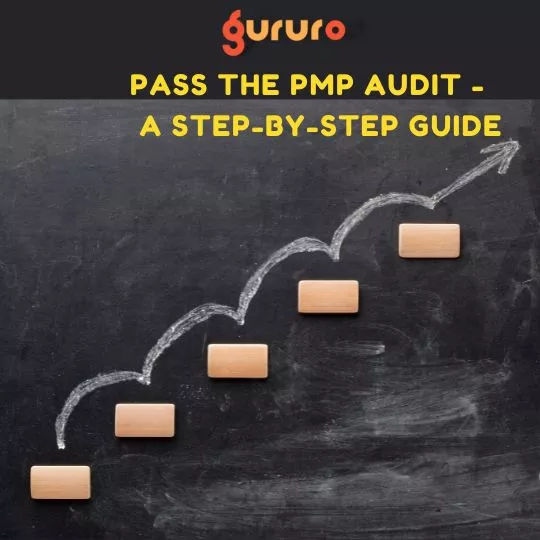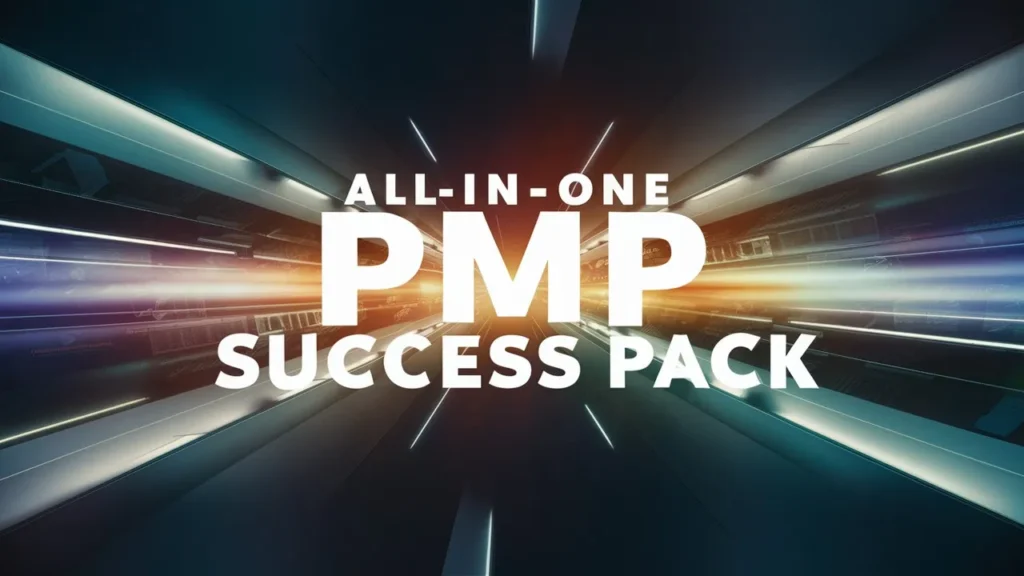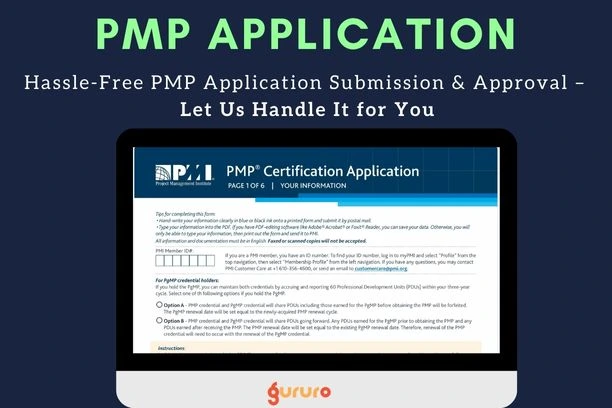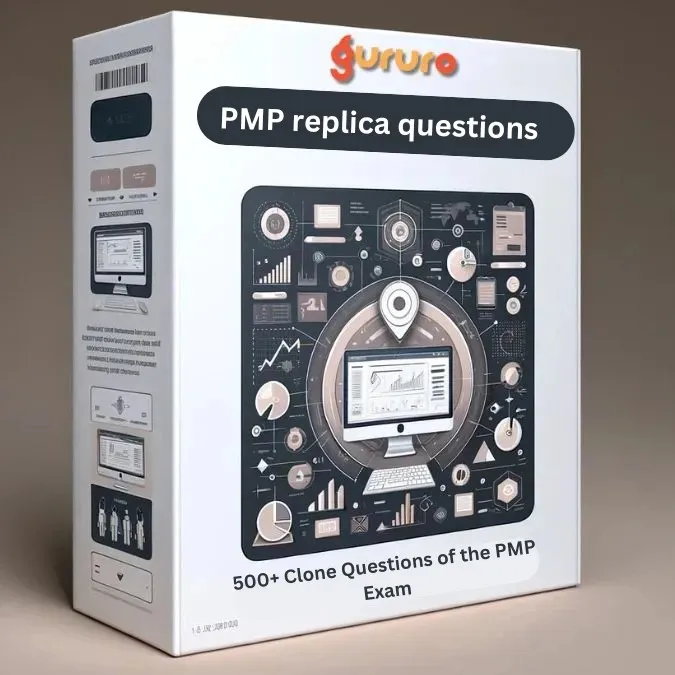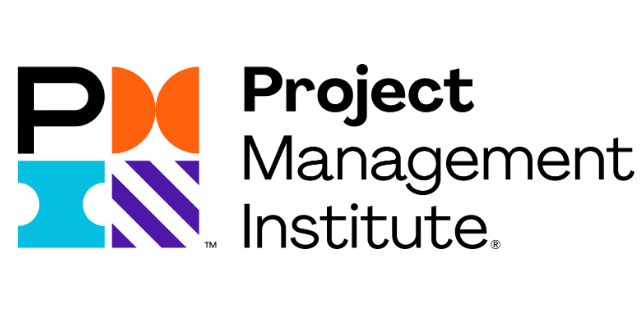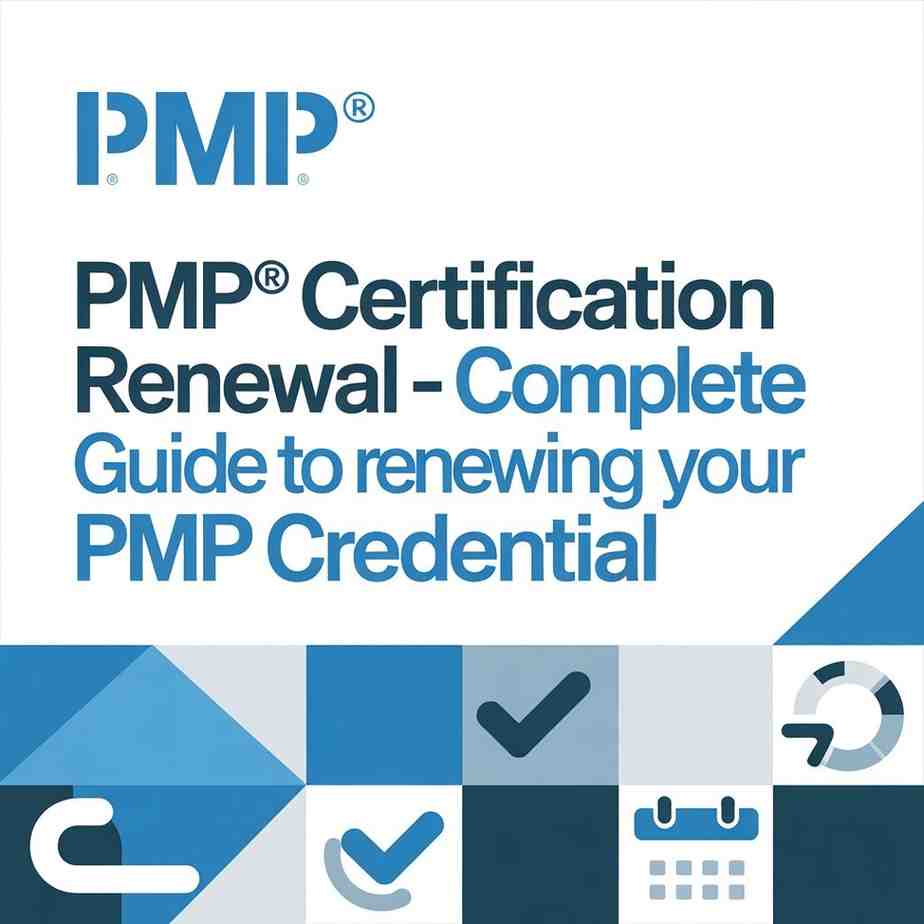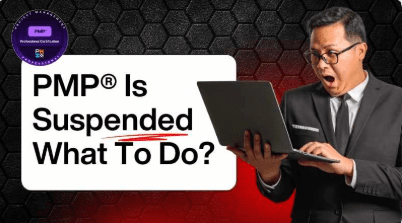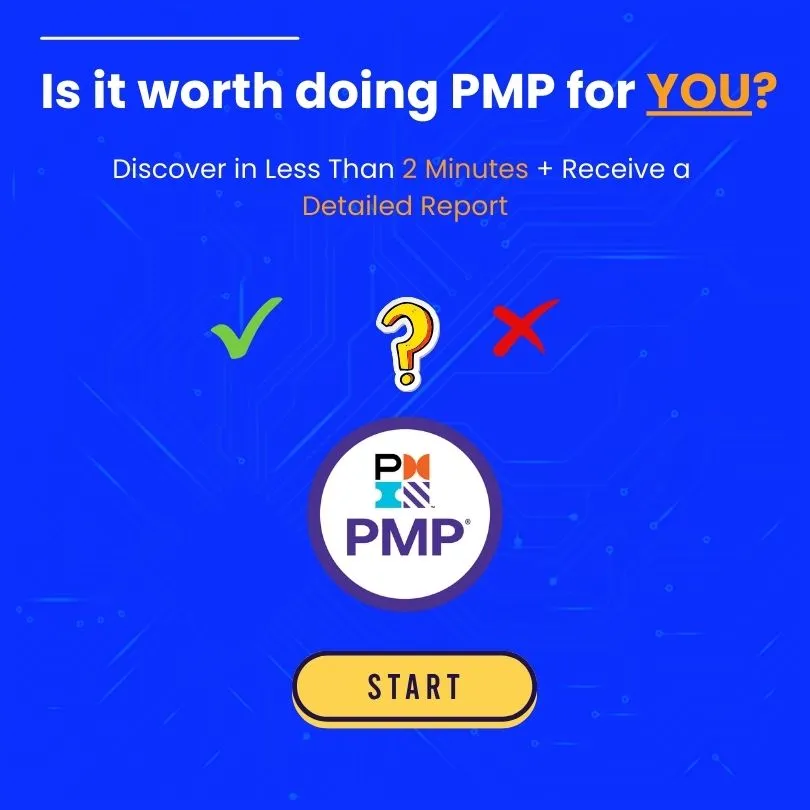Passing the PMP audit can be daunting for aspiring project and program managers, but it doesn’t have to be. The PMP audit process ensures that qualified professionals earn PMI certifications. This guide provides a step-by-step approach to help you understand the PMP audit requirements and confidently prepare for the audit process. Whether you have been randomly selected for a PMP audit or are proactively preparing for one, this guide will help you avoid common mistakes and ensure that you are well-prepared for the PMP audit.
This article – Pass The PMP Audit A Step-By-Step Guide is intended for aspiring project and program managers seeking the PMP certification and may be selected for a PMP audit.
Introduction
The PMP certification is a globally recognized designation for project managers, demonstrating mastery of the skills required to lead and direct projects. The PMP certification process involves an initial application and a rigorous exam, and a percentage of PMP certificate holders are randomly selected for an audit. Is the PMP audit mandatory? No, but PMI randomly selects a percentage of applications to verify eligibility, ensuring the credential’s integrity.
Passing the PMP audit is a critical step before you can schedule and take the PMP exam. The audit verifies your education and experience, confirming you meet PMI’s high standards. Let’s dive into what documents are needed for the PMP audit and how to succeed.
Why PMI conducts Audits for PMP Certification?
The PMP certification is a highly sought-after recognition for project and program managers, and PMI, the governing body behind the certification, is committed to maintaining its value and credibility.
Why does PMI conduct audits? Through the PMP audit, PMI verifies the education and experience listed on your application to ensure only qualified candidates take the exam. This process benefits both the individual and the industry by maintaining the PMP as a symbol of excellence. What happens if you fail the PMP audit? Failure may lead to application rejection, but you can reapply after addressing issues, per PMI’s refund policy.
What are the PMP audit requirements?
The PMP audit process involves submitting verification of three key components: academic Education, project management education, and project management experience.
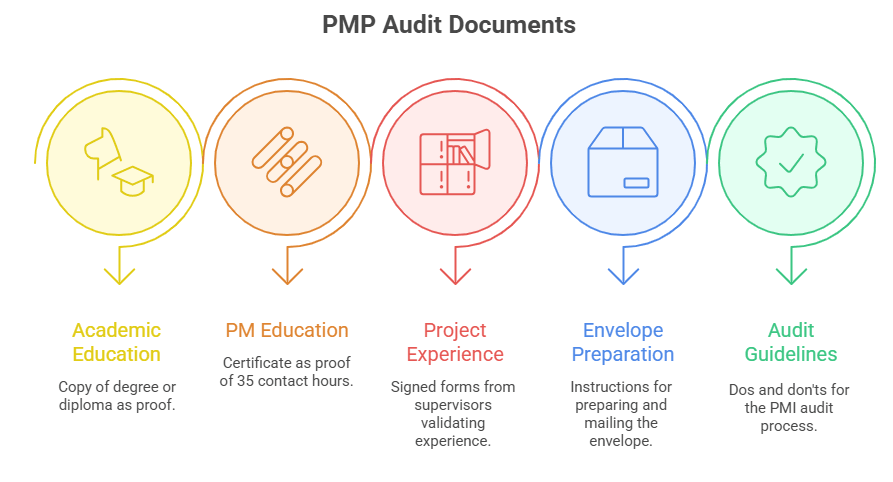
- Academic Education A photocopy of your degree or sub-degree is required as proof of academic Education.
- Project Management Education A photocopy of a certificate for a PMP exam prep course is required, along with a course outline for courses outside of PMI Registered Education Providers (R.E.P.).
- Project Management Experience PMI requires verification of project management experience, including:
- Printing out individual PDF files in the myPMI section on the PMI website
- Preparing an envelope for each supervisor (or grouping multiple projects with the same supervisor into one envelope)
- Sending the forms for signatures from supervisors/managers
- How to get supervisor signatures for PMP audit forms? Send forms to supervisors for signatures and have them return sealed envelopes to you, not PMI.
Mailing the verification documents to PMI
It is essential to carefully review and follow PMI guidelines for the PMP audit process to ensure that the audit goes smoothly and that the required documents are submitted correctly.
How to prepare for a PMP audit
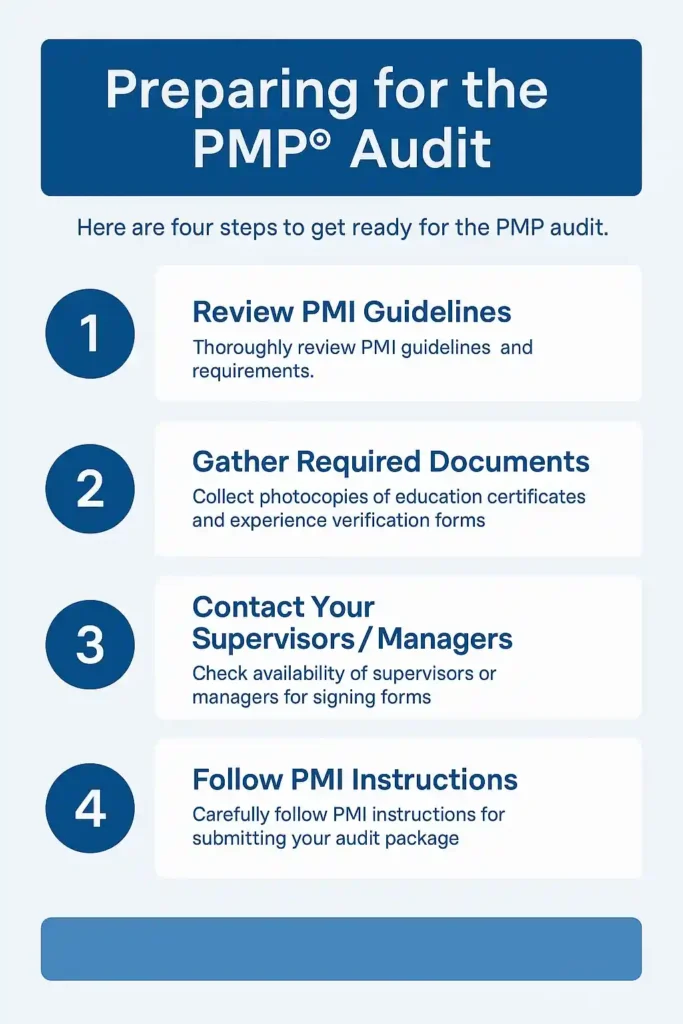
How to prepare for a PMP audit? Start by reviewing PMI’s guidelines to ensure you have all required documents. Gather photocopies of your degree, project management education certificates, and experience verification forms. How to avoid mistakes during the PMP audit? Double-check that all documents are clear, legible, and correctly filled out.
Contact supervisors early to confirm their availability for signing forms. Follow PMI’s instructions for preparing and submitting the audit package, including sealing envelopes correctly. How long does it take to pass the PMP audit? PMI typically processes the audit in 5-7 business days, but allow 2-3 weeks for gathering signatures and mailing. Plan ahead to meet deadlines.
- Review PMI guidelines: Before beginning the PMP audit process, review PMI guidelines and requirements to ensure that you have all the necessary information and documents.
- Gather required documents: Ensure you have all the necessary documents, including photocopies of your academic Education, project management education certificates, and project management experience verification forms.
- Contact your supervisors/managers: Before sending out forms for signatures, reach out to your supervisors or managers to ensure their availability and willingness to sign the forms.
- Follow PMI instructions: Carefully follow PMI instructions for preparing and submitting the PMP audit package, including sealing envelopes and mailing the documents to PMI.
- Plan for processing time: PMI may take 5-7 days to process the PMP audit package, so plan accordingly and allow sufficient time for the audit process to be completed before any deadlines or important dates.
PMP Certification Application and Audit Process
- Submit your PMP certification application to PMI.
- PMI will review your application. If approved, you will receive an email with exam scheduling instructions, and your one-year eligibility period begins.
- Can you take the PMP exam before passing the audit? No, if selected for an audit, you must pass it before scheduling the exam.
- Pay the exam fee within your one-year eligibility window, ideally as soon as possible, to allow enough time for scheduling and re-examination (up to 3 times).
If your application is selected for audit, you will receive an email with instructions on how to comply. Once you pass the audit, your one-year exam eligibility begins. Keep reading to learn more about the audit requirements.
PMP Audit Process
The PMP (Project Management Professional) certification is a highly coveted credential in the project management field. PMI (Project Management Institute) audits select PMP applications to verify the credibility of the certification program and its holders. If your PMP application is set for an audit, don’t worry. How to submit PMP audit documents? Follow these steps:
- Download the Audit Package: After receiving an email from PMI, you’ll need to download the audit package from the PMI Online Certification System.
- Print the Audit Forms: The audit package contains all the forms you need to complete the audit process. Be sure to print all of them.
- Get Manager Signatures: The Experience Verification form requires signatures from your manager(s) or supervisor(s) for each project listed in your application. Each manager/supervisor should sign a separate copy of the form.
- Make Photocopies of Certificates: You’ll need to make photocopies of your diploma/degree certificates and any certificates or letters from your training provider(s) for the 35 contact hours of project management education.
- Package and Send the Audit Materials: PMI requires you to send all audit materials in one envelope through regular postal mail or courier service. Do not fax or email audit documents.
By following these steps, you’ll be on your way to successfully comply with the PMP audit process and earning your certification. Good luck!
The PMI address to send your audit package to is PMI Attn.: Certification Audit 14 Campus Blvd. Newtown Square, PA 19073-3299 USA.
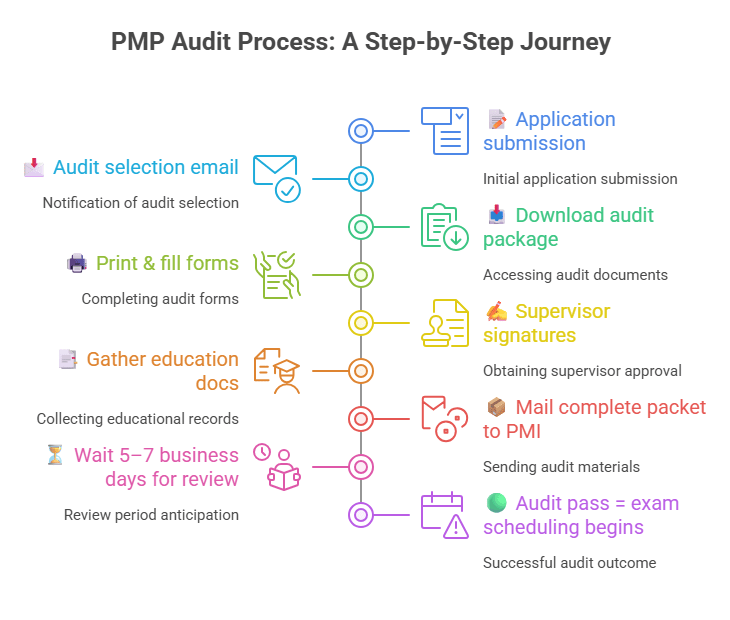
Common Mistakes to Avoid to Pass The PMP Audit
- Not following PMI guidelines: Be sure to carefully review and follow PMI guidelines to avoid errors or omissions in the PMP audit process.
- Incorrect documentation: Ensure that photocopies of all required documents are clear and legible and that all forms are filled out correctly.
- Late submissions: Allow sufficient time for the PMP audit process, and submit all documents promptly to avoid delays or additional fees.
- Neglecting to inform supervisors/managers: Before sending out forms for signatures, ensure that your supervisors or managers know the PMP audit process and can sign the documents promptly.
- Miscommunication with supervisors/managers: Communicate clearly with your supervisors or managers about the PMP audit process and the required signatures to avoid misunderstandings or mistakes.
FAQs
What are the PMP audit requirements for 2026?
The PMP audit requires a photocopy of your degree, a certificate for 35 hours of project management education, and signed experience verification forms from supervisors.
How to prepare for a PMP audit in 2026?
Review PMI guidelines, collect your degree photocopy, course certificates, and experience forms, contact supervisors for signatures, and mail the audit package to PMI.
How long does it take to pass the PMP audit?
PMI processes the audit in 5-7 business days, but allow 2-3 weeks for gathering signatures and mailing documents.
Can you take the PMP exam before passing the audit?
No, if your application is selected for an audit, you must pass it before you can schedule the PMP exam.
What happens if you fail the PMP audit?
If you fail, PMI may reject your application, but you can reapply after correcting issues. Check PMI’s refund policy for details.

